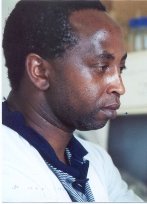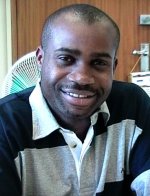Malaria: African scientists fight new wave
26 May 2002 |
 |
| Dr Gilbert Matsabisa | Dr Kelly Chibale |
APRIL 25 is Africa Malaria Day and according to a special supplement on malaria in the February 7, 2002 edition of Nature, the disease remains endemic in more than 90 countries, mainly in the developing world, with between 300 and 500 million new infections each year.
In some areas of the globe it is making a strong comeback. In Africa alone it is estimated that malaria kills one child in 20 under the age of five years. The article reports: "One of the key challenges in the fight is not just to develop effective and safe treatments but also to ensure that these become available to local governments and people at affordable prices. New anti-malarials are also needed because resistance has rapidly been building up against existing treatment."
"Malaria is a disease of the third world and in a sense we need to start solving our own problems," says UCT's Dr Kelly Chibale, who heads the Medicinal and Combinatorial Chemistry Group. For the past two years Chibale has been working on various collaborative studies revolving around malaria chemotherapy.
His task is to design and synthesise new chemical compounds, or chemical libraries, that target a class of enzymes called malarial cysteine proteases. These are involved in the degradation of haemoglobin in the host cell (malaria parasites degrade haemoglobin in the host and make their own in order to survive). Chibale has been working with colleagues at the University of California San Francisco (UCSF) where these chemical libraries are sent for screening in their high-throughput systems.
Chibale recently received a Sandler Fellowship for Basic Research in Parasitic Diseases from the Sandler Centre at UCSF. He will spend four months of his sabbatical there trying to, among other things, identify the novel chemical compounds that will inhibit a malarial cysteine protease called Falcipain-2. In addition, he has been invited as Visiting Professor at the University of Science and Technology at Lille in France on a malaria-related project later this year.
"Not only do we need to develop new anti-malarial drugs, but we need to develop cheap new drugs and this is where my experience as a synthetic organic chemist comes in," he said. "My work in this regard is to develop or synthesise new but shorter synthetic routes to build the molecules that may be cheap and effective anti-malarial enzyme inhibitors."
Chibale is also engaged in a collaborative study with colleague and inorganic chemist, Professor John Moss, and Professor Jacques Brocard from Lille to develop organometallic drugs, which are derivatives of chloroquine, the cheapest anti-malarial drug.
His third project centres on chloroquine resistance reversal, working with Professor Pete Smith of the Department of Pharmacology and French Professor Phillipe Grellier to develop combination therapy, compounds that can be co-administered with chloroquine to overcome chloroquine resistance. "Chloroquine is very cheap, effective and safe and we'd like to retain it. However, because of growing resistance to the drug, we have to look at new ways of making it effective." Basically, these compounds (a.k.a. chemosensitisers) restore the sensitivity of resistant parasites to chloroquine.
The UCT-based South African Traditional Medicines Unit has also made rapid scientific progress in their research into the use of traditional herbal medicines for treating malaria. The Unit's researchers have isolated three plant compounds that may be effective in the fight against the disease. The compounds are from indigenous South African plants that are used by people in traditional communities for a host of ailments.
Dr Gilbert Matsabisa, the MRC's Indigenous Knowledge Systems Health Manager, says that these plants with healing compounds are found in the wild and have been used for decades for fevers and other unrelated illnesses by people in traditional communities.
"There are many perceptions about what causes malaria, traditionally people complain about umkuhlano (fevers) that could be a malarial fever, we need to use that information to develop new drugs and better understand the disease."
Matsabisa has, along with other researchers in the Traditional Medicines Unit, documented traditional information on plants in the country that may have compounds that could be effective in combating malaria.
Recently a plant protein that bolsters the effectiveness of chloroquine was isolated. "If you take the traditional medicine extract from this particular tree and combine it with very low concentrations of chloroquine, the anti-malarial drug becomes effective on the chloroquine-resistant malarial parasites," explained Matsabisa.
The Unit is testing the compound and will apply for a full patent once this has been tested for effectiveness in a living system. According to Matsabisa the unit aims to develop all the compounds into fully tested anti-malarial drugs.
"There is a lot of expertise in Africa where scientists have done basic research in traditional medicines, but they have not carried that over into drug development. We have identified those compounds and we now want to take them into proper drug development under good laboratory and manufacturing practices."
The Unit is part of a consortium (which is comprised of the MRC, the University of Cape Town, the University of Pretoria, CSIR and the National Botanical Institute) that received a three-year grant from the Department of Arts, Culture, Science and Technology (DACST) to develop traditional medicines into scientifically tested anti-malarial drugs for human consumption.
Good news from the research front is that Dr Heinrich Hoppe of the Department of Pharmacology has been awarded a Wellcome International Senior Research Fellowship.
This comes with a full award for expenses, equipment and technical staff for a period of five years. This is in support of Hoppe's experimental work in the pathogenesis of malaria.
 This work is licensed under a Creative Commons Attribution-NoDerivatives 4.0 International License.
This work is licensed under a Creative Commons Attribution-NoDerivatives 4.0 International License.
Please view the republishing articles page for more information.
Related
Balancing the paddle and the law books
12 Feb 2026










